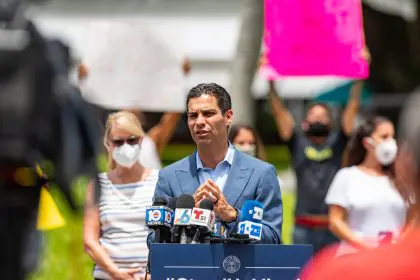juanita bynum – pursuit of happiness
 |
|
photo by steed media service
|
Televangelist/Author/Entrepreneur, Juanita Bynum Ministries
On the heels of the highly publicized public display of domestic violence, Dr. Juanita Bynum is now the self-proclaimed “new face of domestic violence,” according to a recent New York Times article. Subsequent appearances on national television programs like “Good Morning America,” and “Star Jones”on Court TV further solidified Bynum’s intention to be the public face of domestic violence. Bynum asserted to NYT that the public “overly romanticized” her marriage to Bishop Thomas Weeks III, and “what happened to me was reality.”
Regardless of how the public may feel, every incident of abuse should be brought to light, even if it’s at the hands of a celebrated preacher. According to the U.S. Department of Justice, domestic violence is defined as a pattern of abusive behavior in any relationship that is used by one partner to gain or maintain power and control over an intimate partner. The Web site womenslaw.org reports that more than 50 percent of all women will experience physical violence in their relationship. And for 24-30 percent of those women, the abuse will be regular and ongoing.
Domestic abuse shows up in many forms, and in light of the incident that occurred between Dr. Juanita Bynum and her husband, it doesn’t discriminate. – -soul goddess
If your mate, male or female, exhibits the following behavior, consider yourself a victim:
Physical Abuse: Hitting, slapping, shoving, grabbing, pinching, biting, hair-pulling, biting, etc. Physical abuse also includes denying a partner medical care or forcing alcohol and drug use.
Sexual Abuse: Coercing or attempting to coerce any sexual contact or behavior without consent. Sexual abuse includes, but is certainly not limited to: marital rape, attacks on sexual parts of the body, forcing sex after physical violence has occurred or treating one in a sexually demeaning manner.
Emotional Abuse: Undermining an individual’s sense of self-worth or self-esteem. This may include, but is not limited to constant criticism, diminishing one’s abilities, name-calling, or damaging one’s relationship with his or her children.
Economic Abuse: Making or attempting to make a person financially dependent, e.g., maintaining total control over financial resources, withholding access to money or forbidding employment.
Psychological Abuse: Causing fear by intimidation; threatening physical harm to self, partner, children, or partner’s family or friends; destruction of pets and property; and forcing isolation from family, friends, school or work.
Sources: National Domestic Violence Hotline, National Center for Victims of Crime and WomensLaw.org.










